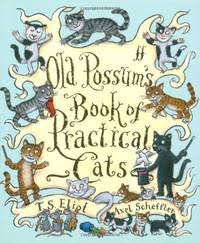T. S. Eliot
Listen to the Recess! Clip
| Author | Kevin Shortsleeve |
| Air Date | 9/23/2004 |

T. S. Eliot Transcript
T. S. Eliot has been called “The greatest literary figure of the English-speaking world in the 20th Century.” He was the recipient of the 1948 Nobel Prize in Literature and his poem, The Waste Land, is widely considered the most influential poem of its age. He was also considered one of the most erudite scholars of his time, intimately familiar with any subject pertaining to literature, from Sanskrit to Dante.
Though influenced by many sources, it is sometimes overlooked what a keen interest Eliot had in children’s nonsense poetry. In 1939 he published a collection of children’s poems, Old Possum’s Book of Practical Cats. “Old Possum” was a nickname Eliot had been given by his friend, fellow poet and editor, Ezra Pound.
While writing these poems Eliot would often visit his friends, Geoffrey and Polly Tandy. He would try the poems out on their three children and in conversation with the adults – he hinted at hoping to get a chance to read them on the BBC radio program, The Children’s Hour. Geoffrey Tandy, who was a radio broadcaster, took the hint and read them on the radio Christmas Day, 1937.
With clear references to children’s nonsense poets like Lewis Carroll and Edward Lear Old Possum’s book uses phrases like, “mad as a hatter” and nonsense names like Jennyanydots, Lady Griddlebone, Skimblshanks, The Rum Tum Tugger, and Rumpleteazer.
T. S. Eliot was always a fan of children’s literature. He was said to have had a life long fascination with the Brer Rabbitstories, he was a fan of Rudyard Kipling and wrote an introduction to Huckleberry Finn. But this side of Eliot has been down played by critics who choose instead to focus on his more serious and erudite pursuits. His “cat poems” as some refer to them, are often filed under the heading “minor works” in bibliographies and the original manuscript of Old Possum’s Book sits quietly in an archive at Princeton University.
But there is more to the story of the “cat poems” than just that – for Old Possum’s Book of Practical Cats had a very strange fate in deed. Fifteen years after Eliot’s death, composer and lyricist Andrew Lloyd Weber found a copy of Old Possum’s Book and decided to make a musical out of it. The result was the Broadway smash hit Cats, which has played to 25 Million People in fifteen countries – being the most successful musical of all time.
T. S. Eliot is remembered today with a large memorial tablet in the Poet’s corner of Westminster Abbey. Of course, Cats is not mentioned on the tablet, but Eliot would probably be happy to know that, a few of us anyway, remember him with a song from Broadway or for a simple, humorous children’s rhyme.